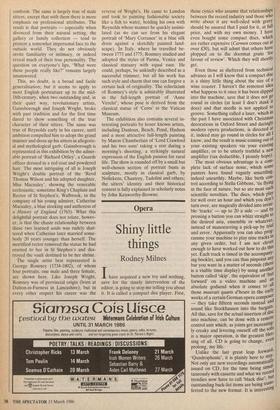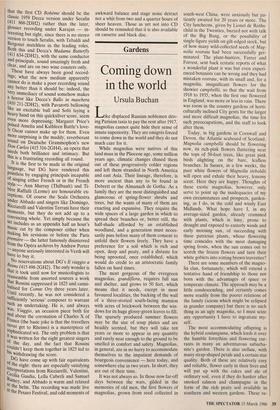Opera
Shiny little things
Rodney Milnes
Ihave acquired a new toy and nothing, save for the timely intervention of the editor, is going to stop me telling you about it. It is called a compact disc player. First, those cynics who assume that relationships between the record industry and those who write about it are well-oiled with gravy should be, assured that I paid for it, at full price, and with my own money. I have even bought some compact discs, which are rather expensive (Carmen comes out at over £30), but will admit that others have plopped on to the doormat gratis 'for favour of review'. Which they will shortlY get. Even those as sheltered from technical advance as I will know that a compact disc is a shiny little thing about the size of a wine coaster. I haven't the remotest idea what happens to it once it has been slipped into the machine, save that it does not go round in circles (at least I don't think it does) and that needle is not applied to groove. Something called a laser, which In the past I have associated with Christmas decorations in Oxford Street and daringlY modern opera productions, is directed at it, indeed may go round in circles for all I know, and the result is music coming out of your existing speakers via your existing amplifier, or to be utterly truthful a nev/ amplifier (tax deductible, I piously hope).
The most obvious advantage is a com- plete lack of surface noise, which some punters have found vaguely unsettling, indeed unearthly. Maybe, like birth con- trol according to Stella Gibbons, 'tis flying in the face of nature, but so are most such scientific novelties. The discs, which pig for well over an hour and which you don,t turn over, are magically divided into invisi- ble 'tracks' — up to 20 a side — and bY pressing a button you can whizz straight to the desired aria, ensemble or whatever, instead of manoeuvring a pick-up by trial and error. Apparently you can also prog- ramme your machine to play nine tracks 10 any given order, but I am not clever enough to have worked out how to do this yet. Each track is timed in the accompanY" ing booklet, and you can thus pinpoint anY bar you want in a matter of seconds (there is a visible time display) by using another button called 'skip', the equivalent of 'fast forward' on a video machine and aft, absolute godsend when it comes to all those mauvais quarts d'heure in the earlY works of a certain German opera composer, — they take fifteen seconds instead anu sound like Stockhausen into the bargain' All this, save for the actual insertion of disc into machine, can be done with a remote control unit which, as joints get increasing- ly creaky and levering oneself off the sofa is a major operation, is the greatest bles- sing of all. CD is going to change, eve° prolong, my life. Unlike the last great leap forward, 'Quadrophonic', it is plainly here to staY- Not only are new recordings automaticallY issued on CD, for the time being sinnuld- taneously with cassette and what we revar t trendies now have to call 'black disc', WI outstanding back-list items are being trans- ferred to the new format. It is interesting that the first CD Boheme should be the classic 1959 Decca version under Serafin (411 868-2DH2) rather than the later, glossier recording under Karajan — in- teresting but right, since there is no stereo version to touch Serafin, with Tebaldi and 13ergonzi matchless in the leading roles. Both this and Decca's Madama Butterfly (411 634-2DH2), with the same conductor and principals, sound amazingly fresh and clear, and are on two wine coasters only. These have always been good record- ings; what the new medium apparently cannot do is make a poor recording sound any better than it should be: indeed, the very immediacy of sound somehow makes a horror like Decca's Ballo in maschera (410 211-2DH2), with Pavarotti bellowing like an excitable bull and Solti laying a heavy hand on this quicksilver score, seem even more depressing; Margaret Price's Poised Amelia and Kathleen Battle's love- ly Oscar cannot make up for them. Even more surprising is the muddy, reverberant sound on Deutsche Grammophon's new Don Carlos (415 316-2GH4), an opera that needs both brilliance and intimacy. But this is a frustrating recording all round. It is the first to be made in the original language, but DG have rendered this Pointless by engaging principals incapable of singing either French or in the French Style Ann Murray (Thilbault) and Ti- bere Raffallj (Lerme) are honourable ex- ceptions. Of course the Scala Orchestra under Abbado and singers like Domingo, Iticciarelli and Valentini Terrani have their moments, but they do not add up to a convincing whole. Yet simply because the set includes as an appendix half an hour's music cut by the composer either when making his revisions or before the Paris Premiere — the latter famously disinterred from the Opera archives by Andrew Porter anyone seriously interested in Verdi will have to buy it. No reservations about DG's II viaggio a Reims (415 498-2GH2). The only wonder is that it took until now for musicologists to reassemble from assorted sources a work that Rossini suppressed in 1825 and canni- balised for Comte Ory three years later. Until recently, he was not considered a sufficiently 'serious' composer to warrant such an undertaking. He is, and always Was. Viaggio, an occasion piece both for and about the coronation of Charles X of Prance (the basic joke is that the travellers never get to Rheims) is a masterpiece of s.oPhisticated wit. The only problem is that it Was written for the eight greatest singers uf the day, and the fact that Rossini cOuldn't keep them together in 1825 led to tus withdrawing the score. DO have come up with fair equivalents Of the eight: there are especially satisfying I,..,uterpretations from Ricciarelli, Valentin', Gasdia, Lella Cuberli and Samuel Ramey, and Abbado is warm and relaxed at the helm. The recording was made live at the Pesaro Festival, and odd moments of awkward balance and stage noise detract not a whit from two and a quarter hours of sheer heaven. Those as yet not into CD should be reminded that it is also available on cassette and black disc.



















































 Previous page
Previous page